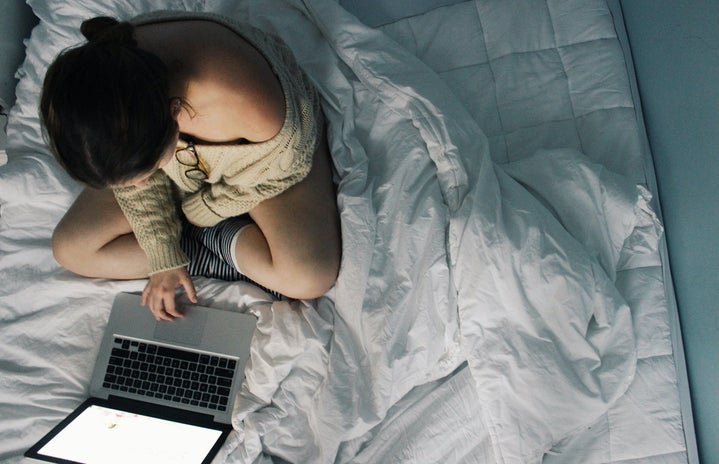Over the past few weeks, many people have had to get crafty with their communication methods as social-distancing has been enforced in communities nationwide. As college students, we are not exempt from this sudden expansion onto the online realm; the COVID-19 pandemic has pushed the boundaries of college courses as discussion classes are now held on video chatting platforms and lectures are live-streamed to our homes. In a time where work, play, and everything in-between is occurring in our living spaces, we find ourselves wondering what it means to be “productive” while in quarantine.

Productivity, as YouTuber Tiffany Ferguson explains in her video Our Productivity Obsession, can be a nearly addicting force in our “workaholic” culture. We turn to the feeling of productivity, whether it manifests through work, school, or other tasks, in order to feel accomplished. With the current lockdown measures in place, we are witnessing a rise in media that is centered around this idea of achieving peak productivity. It is difficult now to look on large social media platforms, such as YouTube and Instagram, and not come across trendy tips for working at home or how to take this opportunity to curate your dream body. This “hustle culture”, as Tiffany calls it, gives us temporary gratification while ignoring the long-term burnout effects of an overactive lifestyle. So, if this feeling of satisfaction is directly linked to checking off things on our to-do lists, shouldn’t we be seeing a dramatic rise in our productivity now that social distancing has taken away many of our favorite “time-sucking” activities?

Even the Centers for Disease Control and Prevention recognizes that the widespread lockdown measures have a significant effect on our mental health. According to the CDC website, our current isolative lifestyle has negative impacts on many sectors of our well being, such as stress, anxiety, and depression. To lessen these consequences of social-distancing, they recommend self-care tactics such as “[taking] breaks from watching, reading, or listening to news stories” and “[getting] plenty of sleep”, directly opposing the idea of hyper-productivity that seems to loom in work atmospheres worldwide.
Along with the harmful impacts that social-distancing can have on our mental health, the added stress can also take a heavy toll on our learning capabilities. According to Harvard Health Publishing, chronic or prolonged stress can turn our brains from “memory mode” to “survival mode”. They suggest that we are less able to do less significant tasks, such as memorizing vocabulary for an upcoming quiz, when we have larger issues on our minds. Unsurprisingly, this may explain why it often feels impossible to stop scrolling through your Twitter news while you’re supposed to be watching a lecture.




